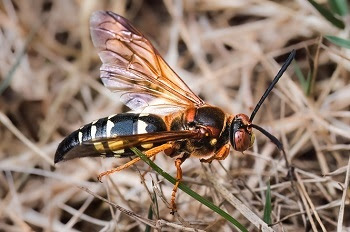
Cicada killer wasp (DNR photo)
The name sounds scary: Cicada Killer Wasps.
But the Michigan Department of Natural Resources assures us in its latest newsletter that the "cicada killer wasps are nothing to fear.'
As cicadas surface this summer in Michigan, so do the cicada killer wasps.
The DNR writes:
Measuring over an inch in length, these wasps are built to capture and subdue large adult cicadas. Only female wasps have stingers, which they use to inject venom into their prey and carry it back to their burrow.
Cicada killer wasps are solitary, and female wasps use their short time as adults to dig burrows where they stash the cicadas they catch and lay their eggs. While male wasps may be territorial or act aggressively, they lack a stinger and pose no danger to people; females sting only in self-defense. Just like the cicadas, cicada killer wasps die as summer wanes.
“You may see these wasps while you’re outside this year and immediately think of the stories of giant murder hornets invading North America,” DNR game biologist Karen Cleveland says in the newsletter. “Don’t worry. This secretive native insect has been here all along, and can be found silencing cicadas across the entire eastern U.S.”
Howard Russell of the Michigan State University Diagnostic Services, Department of Plant Pathology, writes:
Despite their large size and impressive stinger, cicada killers do not readily sting and one can stand amongst their burrows and watch them work without fear of being stung as long as one remains considerate and respectful, i.e., don’t try and catch one with their hands. Most people I talk to, however, seem reluctant to get that close and would rather kill them off.
Adult dog-day cicadas surface every summer in Michigan. After a month or two, they die.
Then about every 17 years, the periodical cicadas surfaces in mass.


 by
by







